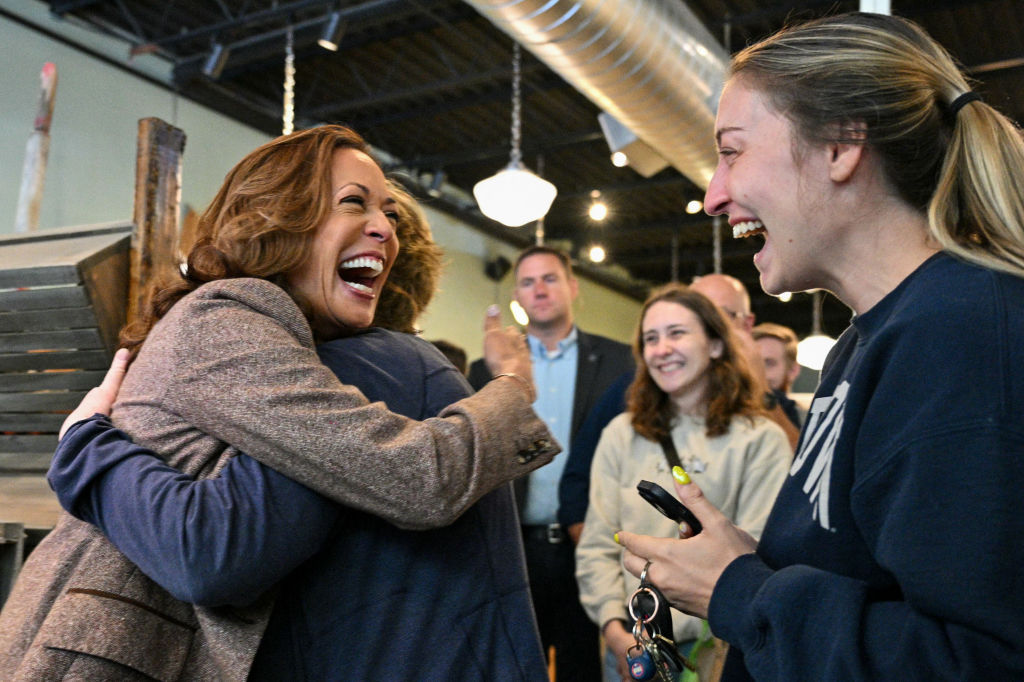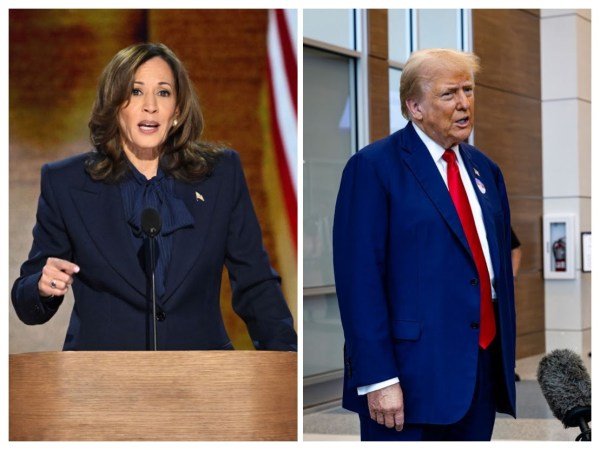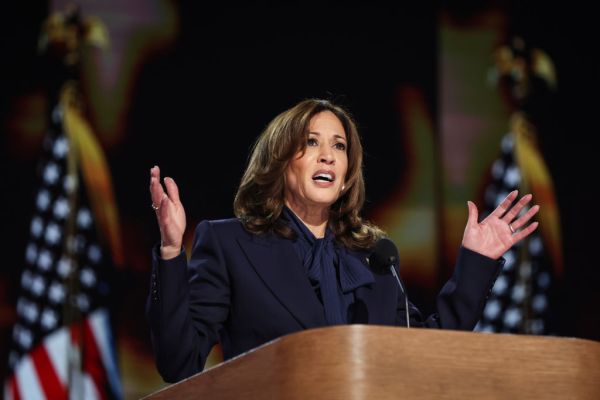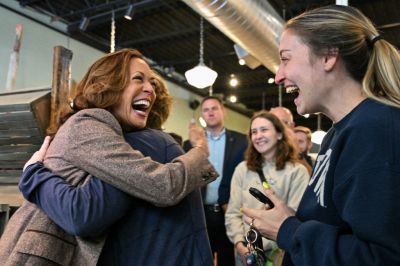An advantage to writing every day instead of twice a week is that sometimes you get to steal a thought from one of your smarter colleagues before they’ve had a chance to turn it into a column.
Take this tweet from Jonah Goldberg, which might have been fodder for a G-File before I shamelessly swiped it to feature here.
“It seems to me that [Kamala] Harris was initially smart to avoid media and ride the vibes. Lots of Dems came home. [North Carolina] and Georgia came back into play,” he wrote Tuesday morning. “But she blew past the point of diminishing returns with her too-controlled strategy. Absent providing direct evidence—not cutesy leaks from unnamed spokespeople—that she’s a moderate, voters are making the reasonable default assumption that she’s a continuation of Biden and not a break with him. Hence her ability to run as the change candidate is evaporating.”
Is that right? Did Harris “ride the vibes” a bit too long?
He’s right that her pretensions of becoming the “change agent” in the race have been damaged, at least according to the latest New York Times poll. “More than 60 percent of likely voters said the next president should represent a major change from Mr. Biden, but only 25 percent said the vice president represented that change, while 53 percent said Mr. Trump, the former president, did,” the paper reported Sunday, finding Trump ahead nationally by 2 points.
Times pollster Nate Cohn noted in a separate analysis how people responded when asked whether each candidate represents “change” or “more of the same.” For Harris, the split was 40-55. For Trump, a man who spent four years as president and has been his party’s nominee for three straight cycles and counting, it was 61-34.
Tonight is her last, best opportunity to convince voters that she’s a centrist and to reclaim the mantle of “change,” Jonah concluded. That makes sense, yet I find myself skeptical that Kamala Harris can switch from being a “vibes candidate” to something like a “policy candidate”—or that she’d benefit from doing so, even if she can.
For better or worse, I think she’s stuck riding the vibes until Election Day.

Are undecideds really undecided?
If Jonah is right that Harris’ vibe-y “blank slate” strategy has reached a point of diminishing returns then when was the optimal moment for her to have pivoted away from it and toward being an outspoken centrist?
After all, she spent 40 minutes at the Democratic convention in front of one of the largest audiences she’ll ever have putting meat on the policy bone. She sounded moderate-ish enough in doing so that she gave some Dispatch staffers flashbacks to the 2012 Republican convention.
It didn’t help her a bit. Her polling in the RealClearPolitics national average on the day she spoke was 48.4 percent. As I write this on September 10, it’s 48.4 percent. Trump has shaved a few tenths of a point off of her lead in the interim.
It’s hard for me to believe that, had Harris only provided a bit more “direct evidence” of her newfound moderation by doing a press conference or two before that speech, her polling would be meaningfully better now. One could as easily argue the opposite, that her upward trend in polling stalled because her convention address finally forced her to start getting specific on policy.
So long as she was the generic Democrat of everyone’s dreams, riding on pure “vibes,” she was rising. Only when circumstances forced her to ditch the “blank slate” approach and start fleshing out her agenda did things begin to go sideways. That augurs badly for the debate, when she’ll once again be compelled by the moment to delve into policy details that are destined to offend some of the 56 percent of Americans who had rated her happy-happy-joy-joy campaign positively thus far.
The counterargument to all of that comes from Harris adviser David Plouffe, who flagged a key difference between his candidate and Trump recently. “She’s the one with room to grow,” he told Politico. “The Trump of ‘16, voters wanted to know more about him. Now, when Trump goes out there and campaigns and does interviews, it’s questionable how helpful it is. With Harris, it’s very helpful. We have a market of voters out there who want to know more about her.”
The polling backs him up. In the Times survey, 28 percent of likely voters said they felt they needed to know more about Harris versus 9 percent who said so of Trump. Among undecided voters specifically, fully 48 percent said they need to know more about Harris. For Trump, that share was 18 percent. She, not he, has an opportunity to make an impression on voters in Tuesday night’s debate.
But there’s peril in that, and not just because “room to grow” also implies room to fall if that impression ends up being a bad one. Tell me this: How many of the undecided voters who “need to know more” about Harris before forming a preference in this race are truly open to supporting her?
Sure, some are. It’s a big group. But my (typically pessimistic) suspicion is that most Americans who are still thinking of voting for Trump at this late hour are quietly trying to talk themselves into doing so. They might feel embarrassed enough by their preference to force themselves to give Harris a semi-serious look, but they’re not going into this debate hoping to find things they like about her in order to justify voting Democratic. They’re hoping to find things they don’t like about her in order to justify voting for Trump.
And someone who’s looking for reasons to dislike a politician will find them.
Times columnist Ross Douthat articulated my own feelings about the race in a piece last week. “I think if Harris were on track to win, she would be leading more decisively at the moment,” he argued. “She has enjoyed an extended period of extraordinarily positive media coverage while the rival ticket flailed around trying to figure out an effective line of attack. She recently had the benefit of her party’s convention, which wrapped up on Aug. 22 and was—in the press, at least—extremely positively received. And yet after those two boosts she still isn’t clearly ahead of Trump in the Electoral College race—which suggests that she probably now has more room to fall than rise.”
Harris’ “blank slate” strategy was an experiment. What if we replaced an unpopular geezer at the top of the ticket with a young-ish mainstream liberal who still has her wits about her? Does America fear and loathe Donald Trump enough, after impeachments and insurrections and indictments, to hand a generic Democrat a 6- or 7-point national lead right out of the gate and then dare Trump to figure out a way to cut into it?
America does not. The experiment failed. Voters are in fact willing to choose Trump over a generic Democrat running on “vibes,” at least if that Democrat works in the Biden White House. It seems unlikely to me that Harris becoming less inoffensively generic by fleshing out a policy agenda at the debate will make her more appealing.
In hindsight, if Jonah is right that Harris should have ended her media quarantine sooner, I think it has less to do with her having missed a chance to define herself as centrist on policy and more to do with how her cautiousness raised doubts about her mettle. “Right now, Harris is an inaccessible curiosity,” Noah Rothman noted on Monday. “Soon enough, that perception will evolve into the assumption that she is fragile—that she cannot handle extended exposure to challenges that demand quick thinking and deft maneuvering.”
“Fragility” isn’t a quality voters will tolerate in a president. That’s why Joe Biden is no longer his party’s nominee. If Harris comes off as fragile at the debate, look out.
Peril and potential at the debate.
I have a hard time imagining what Harris could say on policy that would make a strong positive impression on swing voters, frankly. She’s not going to make America fall in love with her mundane Democratic agenda in less than two hours. She’s certainly not going to paint a policy picture so vividly different from that of her boss that viewers come away thinking, “Why, she’s nothing like Joe Biden at all!”
She can and will perform various acrobatic flip-flops toward the center on Tuesday evening, but at a certain point the number of reversals becomes more newsworthy than the substance of them. Last week Axios counted no less than nine different issues on which she’s either changed her mind or on which her current position is unknown. She took some very—very—progressive positions as a presidential candidate in 2019 and now has to undo as much of that damage as she can in roughly 40 minutes of speaking.
As the changes of heart pile up in real time, will viewers feel reassured by her newfound centrism or will they conclude that she’s a feckless con artist feigning centrism to attract swing voters?
She’ll also be pressed with various questions to which there are no good answers, like what inspired her to change so many of her positions and what she knew about the White House cover-up of Joe Biden’s cognitive decline. How likely is it that, in trying and almost certainly failing to answer them convincingly, she won’t come off as defensive and untrustworthy?
In fact, insofar as Harris has something to offer on policy that swing voters like, odds are good either that Trump is offering the same thing or that she cribbed her proposal from Joe Biden’s platform. Which isn’t a great look for an aspiring “change candidate.”
At this stage in America’s civic decline, it’s frankly anyone’s guess what percentage of viewers understand complex policy problems or take seriously the challenge of solving them. Harris could lay out a seven-point plan to secure the border and Trump might respond by babbling about Haitian immigrants eating cats—and he could plausibly be judged to have won the exchange by most viewers. The fact that he can’t string three coherent sentences together when asked a basic question about child care, say, hasn’t stopped him from becoming the odds-on favorite to win this fall.
If she wins this debate, it won’t be because of policy. It’ll be because of … “vibes.” And her campaign operatives seem to know it, which is why they’ve gone out of their way to try to play mind games with her opponent beforehand.
Last month NBC News reported on her debate preparations and alleged that “Harris and her team are focusing on … how to needle Trump to rattle him.” As if to confirm that, her campaign began running an ad in the hours before the event on Tuesday showcasing Barack Obama’s joke at the Democratic convention about Trump’s puny size. (Crowd size, that is.) Later in the day, Team Harris announced that former Trump aides Anthony Scaramucci and Olivia Troye will attend the debate and serve as surrogates—for her.
There’s logic in all that. The more irritated Trump is, the more likely he is to say things that’ll remind viewers he’s a fascist ogre who’ll embarrass the country again in a second term. Harris can’t be the “change candidate” if the campaign is about policy, but she can if it’s about turning the page on the dour, divisive, miserable “vibes” of the Trump-Biden-Clinton era, which is what her vacuous happy-happy-joy-joy message is all about. The Trumpier Trump is this evening, the more refreshing and appealing Harris will be by contrast, in theory.
“The vice-president and her aides have kept much of their focus on fine-tuning ways to keep presenting her as representative of a new political era,” New York magazine reported last week about the campaign’s debate preparations. That’s the whole “vibes” strategy in a nutshell. There’ll be more policy chitchat this evening than she’s used to but Harris’ theory of the race is unchanged from when she took the baton from Biden in July: Trump’s bad “vibes” might not be enough to bounce her out to a 7-point national lead but ultimately they’ll alienate enough voters to hand her the presidency.
Certainly, they’re more likely to do so than picayune differences about the size of the child tax credit will, anyway.
Her approach isn’t crazy. Although the Times poll had her trailing badly on questions of which candidate is more likely to bring about “change,” she’s fared better in others. A new survey from Marist, for example, finds Harris ahead, 52-47, when Americans are asked which of the two nominees most represents change. Among independents specifically, she led Trump 53-45.
All she has to do to succeed tonight, perhaps, is to egg him on to be the worst Trump he can be and to take care not to offend any voters herself. “Bringing out Mr. Trump’s most self-destructive instincts is a priority for Ms. Harris, as is coming across as coolheaded and presidential,” the Times revealed this weekend. Vibes-wise, that’s night and day.
It’s also easier said than done.
Parting advice.
If—or rather, when—Trump starts insulting Harris tonight, how should she respond?
If she insults him back, she’ll be giving Team Trump the sort of political street fight it craves. “If you think this race is going to be decided on likability, you’re making a grave error because neither one of them is going to be liked at the end of this race,” one Trump adviser warned the Washington Post last month, but his team’s efforts to dirty her up have failed so far. On Monday, for the first time in more than three years, Harris’ favorability in the RealClearPolitics average was net positive; as recently as two months ago, she was 16 points underwater and less popular on balance than Trump.
Her cheery “vibes” campaign hasn’t produced a meaningful polling lead but it’s been a smash success in rebuilding public goodwill toward her. If she gets in the mud with Trump tonight, her appeal as the change agent in the race who’s supposedly going to bring sunnier “vibes” back to American politics might falter.
On the other hand, if she refuses to get in the mud, which seems to be her preferred approach, she risks coming off as conflict-averse and, well, “fragile.” That’s dangerous for any would-be president, particularly a woman.
Whatever she ends up doing, my advice would be to stay true to her upbeat new-era attitude in order to preserve her meager claim to the change mantle. She should have no difficulty proving she has the intellect to do the job; between the amount of preparation she’s done and the degree to which Trump’s brain has turned to oatmeal, she’ll be the more substantive of the two onstage. But the contrast on policy won’t be stark enough to move swing voters en masse.
The starker contrast is on “vibes,” between the authoritarian tumult and relentless boorishness of Trump 2.0 and the next-gen hopey-changey no-false-moves liberalism of Harris 1.0. She needs to be a happy forward-looking warrior.
And she would profit, I think, from taking the advice of my colleague Chris Stirewalt by ignoring Trump to whatever extent reasonably possible and speaking directly to the audience instead. It’s not just that denying him attention will get under his skin, although it will. It’s that, uniquely in the modern era, this is less a debate between two presidential candidates than an audition for one of them. In a normal campaign, having been put through the wringer of primary debates and primary election, Harris would be a well-known political quantity by now. As it is, thanks to the switcheroo in July, she has a singular opportunity to introduce herself on her own terms to tens of millions of voters who are only now starting to pay attention.
Nothing would signal her intention to turn the page on the Trump era better than treating Trump himself as an afterthought while she goes about having a conversation with Americans. Here’s hoping it works out for her.






Please note that we at The Dispatch hold ourselves, our work, and our commenters to a higher standard than other places on the internet. We welcome comments that foster genuine debate or discussion—including comments critical of us or our work—but responses that include ad hominem attacks on fellow Dispatch members or are intended to stoke fear and anger may be moderated.
With your membership, you only have the ability to comment on The Morning Dispatch articles. Consider upgrading to join the conversation everywhere.